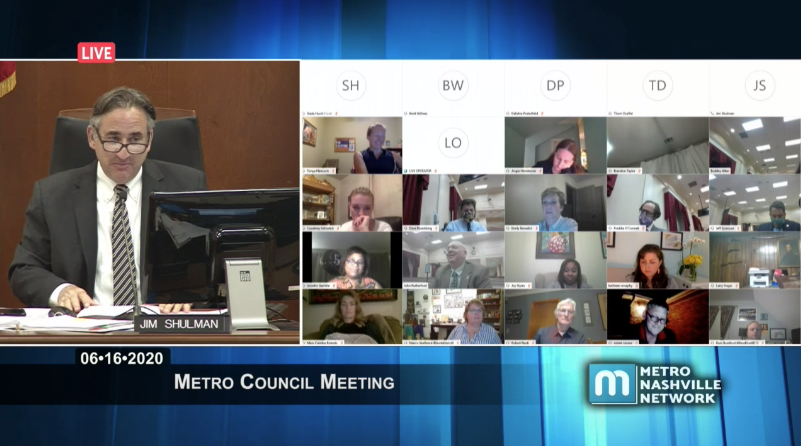
Nashville residents will pay dramatically higher property taxes in the coming year after the Metro Council approved a rate increase of about 34% early Wednesday morning.
Annual tax bills will rise by more than $700 for median-value Nashville homes, which census figures value at about $277,000. The increase differs slightly between the General Service and Urban Service districts, with slightly more tax burden on the urban area.
For paying more, residents won’t get much in the way of increased Metro services, as the new revenue largely fills holes made by a confluence of crises.
“For several years now, it’s been clear the property tax rate needs to be changed,” said Councilmember Bob Mendes, who crafted the approved budget. “This is an investment in who we are as a city.”
The council’s 32-8 budget vote, after 1:20 a.m., concluded a dramatic budget season.
Officials have had to reckon with Metro’s financial crisis — which was compounded by the economic impact of the coronavirus pandemic — as well as a late-surging grassroots movement that sought to reprioritize funding away from law enforcement and toward education and social services.
Perhaps the biggest turn of the night was a decision, after midnight, to increase next year’s funding for Metro police by $2.6 million. That amount was proposed by the mayor, but appeared to be on the chopping block after a public groundswell to cut spending on law enforcement.
Officials said that without the funds, police would have cut 48 recruits.
The budget debate, which ran more than five hours, included few other close votes. The vote was relatively close, 21-9, with 10 abstentions.
In a statement, Mayor John Cooper said the budget was the result of compromises and “tough choices” that will stabilize city finances.
The crisis budget approved tonight stabilizes Metro’s finances and maintains essential services. The large tax increase is something I would not have considered were we not facing Nashville’s greatest financial challenge. I thank @mendesbob and Council for their leadership.
— John Cooper (@JohnCooper4Nash) June 17, 2020
Dissenting councilmembers argued Metro has not done enough to trim its spending or to shoulder some of the pain of the pandemic-driven economic retraction.
And they worried about tax bills for their constituents.
“In my district, I have a lot of retired people. They’re on fixed incomes,” said Councilmember Larry Hagar. “I’ve had very few people in my district who are for any kind of tax increase.”
The outcome opts for a substantially larger tax increase than the council flirted with the past two years. There’s been wide agreement among councilmembers that Metro government services have been limping along after budgetary trims in recent years.
The debate shifted this year. Prior tax debates contemplated how to put money into expanded programming. But this year’s decision mostly taps a large tax increase to maintain the status quo and avoid severe cutbacks or layoffs.
Budget in detail
The approved budget was crafted by Councilmember Bob Mendes and largely based on an initial proposal from Mayor John Cooper.
But some of the adjustments that the council approved include:
- channeling more money to Metro Schools;
- giving city employees a 1% cost-of-living pay increase;
- replenishing the city’s rainy day reserve fund;
- avoiding cuts to arts grants and nonprofits;
- continuing Nashville Community Education, which faced elimination, and;
- hiring two high-level officials to work on diversity within Metro.
Hear how Mendes outlined his budget to the council:
On education funding, Mendes initially moved about $12 million more toward the school district. A portion will raise the district’s minimum wage to $15 per hour, impacting about 1,500 employees, he said. School leaders will decide if the other funds go toward a pay raise.
The council also decided to go further. In one of the only substantial amendments during the meeting, the group decided to add up to $8.2 million more for step pay increases for schools employees, as long as that move doesn’t drop the district’s bank accounts below a state-mandated minimum.
The availability of the money could depend on recent district spending.
“We’ve had a lot of people tell us if we’re going to do [a tax increase], we have to make sure we’re spending it in areas that support our community,” said Councilmember Zulfat Suara. “And there is a big move for MNPS and the teacher salaries.”
Metro’s budget still asks city departments to make more trims in the coming year, following savings efforts the past two years. The city initially hoped to stop that practice.
Many other suggested tweaks were rejected. The council shifted $62,000 to create a human relations staff position that focuses on military veteran services.
Alternatives discussed but dismissed
The budget decision came amid a procedurally dense council meeting that began late, slogged through virtual meeting glitches and at times was slowed by the rules that govern meetings. A Twitter thread of updates is online here.
Members debated two dozen potential budget amendments and multiple competing proposals regarding the tax rate. The council ultimately voted favor of the Mendes budget by a wide margin.
But that wasn’t before they chewed on other ideas. Among what they rejected were several combinations that would have led to a smaller tax increase. They also voted against proposals that would have raised the wheel tax in exchange for a somewhat smaller property tax increase.
The council debated but denied a one-year hiatus on economic incentives to companies, and two proposals to cut police funding — one by $7 million and one by $107 million.
At nearly six hours, the final budget debate battered some councilmembers, and several lamented the flow of the meeting and the entire, multi-month budget process. Councilmember Colby Sledge called the process “profoundly broken,” and Councilmember Dave Rosenberg said it “sucks.”
“Instead of having a conversation about the priorities of our city,” Rosenberg said, “we’re sitting here dealing with this and it’s discouraging.”

